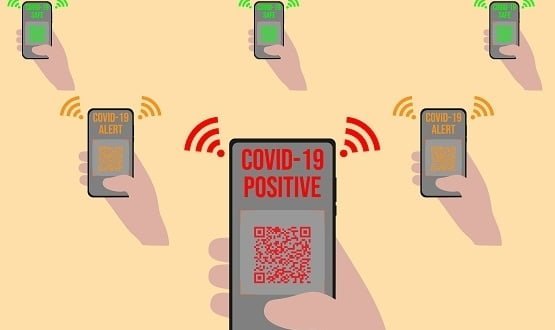A computing company has warned of “fundamental flaws” in using Bluetooth for contact-tracing technology but claims NHS leaders have ignored their communications.
In an open letter to Prime Minister Boris Johnson dated 27 April, Darren Scott, managing director of Deane Computer Solutions, said he and his staff had been trying to get in contact with NHSX and NHS Digital for 27 days.
“We have called, emailed and tweeted, NHS Digital, NHSX, our MP other local MPs, members of the cabinet, even called your office twice,” states the letter, seen by Digital Health News.
“We have registered on portals, sent emails to generic mailboxes, tried contacting the WHO [World Health Organisation] only to be told to speak with our member state…and resorted to writing an open letter to you.”
Scott raises several concerns with Bluetooth tracing in the letter, instead suggesting a system based on QR Codes would be more effective.
He suggests Bluetooth is unable to measure distance between tow devices “in practical use with a good degree of accuracy” which could therefore result in false positive.
Bluetooth is also unable to detect if a person is wearing PPE, Scott writes, adding: “The person wearing full or partial/practical PPE will be identified as the same risk as a person wearing none. Yet more false positives.”
But he says QR Codes would result in less false positives and negatives than Bluetooth.
“A QR Code based solution uses explicit rather than implied connections. You simply scan when you actually connect with someone, you scan locations like train carriages, taxis, offices, the restaurant table you sit at,” the letter states.
“Because of this, such a solution actually has the ability to track surface risk. One person unknowing with Covid-19, scans the QR, boards the tube and grabs the handrail and later confirms they have Covid-19. With QR codes you can notify all those that boarded the same tube, within a specified time window they have been exposed, as well as advising the likes of TfL they need to clean that carriage.
“The biggest challenge QR codes face is getting people to scan, but that’s no different than having people adopt a different solution. People are more likely, however, to adopt an approach that is accurate, does not have the perceived risk of big brother tracking their every movement, than one riddled with false positives/negatives.”
More on Covid-19 contact tracing apps
- NHSX sets up ethics advisory board to oversea contact-tracing app
- Contact-tracing apps could ‘catastrophically’ hamper trust, academics warn
- Imperial white paper outlines key data questions for contact-tracing tech
- ‘Absence of evidence’ for Covid-19 contact-tracing apps, review finds
- Digital Health Unplugged: April news team debrief (from home)
- NHSX must be ‘upfront’ about contact-tracing app, privacy group says
While Bluetooth is being used by most developers in contact-tracing technology, other solutions including QR Codes have been looked at. New Zealand’s Ministry of Health is looking at the use of QR codes, so people could check in at businesses or places.
Several concerns have been raised about data and privacy in relation to contact-tracing apps. Experts have warned that the tech could “catastrophically hamper” public trust if they become tools for mass surveillance.
And BCS, the Chartered Institute for IT, has found those developing the apps need to have the right privacy measures in place if they are going to convince the public to use them.
A spokesperson for NHS Digital said the organisation was not involved in the development of the NHS contact-tracing app.
NHSX has been contacted for comment.
Have you had similar problems getting in contact with the NHS? Contact adowney@digitalhealth.net


12 May 2020 @ 16:22
I agree – it seems like the suggestion was tail wagging the dog.
If you’re going to do mass automated tracking like this, it has to be something that suggests moving away from people as risk of infection is increasing. You’re never going to be able to get a perfect solution at this scale.
So, we either something that highlights risk… and is better than nothing (the flaw in approach seems more to do with NHSX arrogantly turning away from the sustainable solution being built by Apple-Google) or we all just stay indoors until this whole thing blows over.
12 May 2020 @ 14:14
I’d love to understand exactly how this would practically work. How would you get these QR codes to EVERY LOCATION required for it to work? Who would stick the codes everywhere? Would I have to ask the person I’m stood behind in a queue at the supermarket for 45 minutes as I wait to shop if I can quickly scan their code? Will I remember to scan every possible code I see or come into contact with? Whose code would I need to scan? How is this a practical idea?
12 May 2020 @ 11:15
They probably ignored it as the concept of everyone actively scanning every location they visit and every person they speak to is just crazy. The overhead of barcoding every location a person might visit is completely unworkable.